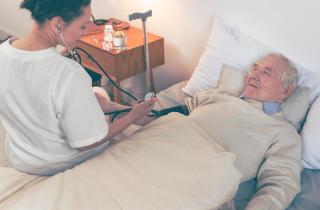Dealing with Chronic Illnesses in Elderly Home Care: Comprehensive Solutions for Seniors
Caring for elderly individuals with chronic illnesses requires a dedicated and well-structured approach. Many seniors live with long-term conditions such as diabetes, heart disease, arthritis, and dementia, which demand specialized care and attention. Providing chronic illness care for the elderly at home ensures that they receive the support they need while maintaining their comfort and dignity. In this article, our home care services unit will explore home care for chronic conditions, strategies for managing chronic diseases in seniors, and how professional caregivers can improve the quality of life for elderly individuals facing these challenges.
The Importance of Chronic Illness Care for Seniors
Chronic illnesses can significantly impact a senior’s daily life, making it difficult to perform basic tasks, maintain mobility, and manage pain. Without proper support, these conditions may lead to complications, hospitalizations, and reduced independence. Elderly care for chronic illness focuses on personalized, long-term care that addresses medical needs, pain management, and emotional well-being.
Common chronic illnesses among seniors include:
- Diabetes – Requires blood sugar monitoring, a controlled diet, and medication management.
- Heart Disease – Needs careful monitoring of symptoms, medication adherence, and lifestyle modifications.
- Arthritis – Causes chronic pain and mobility issues that benefit from physical therapy and assistive devices.
- Dementia/Alzheimer’s Disease – Demands structured routines, memory support, and a safe living environment.
- Chronic Obstructive Pulmonary Disease (COPD) – Requires respiratory therapy, medication management, and oxygen therapy.

Home Care Solutions for Managing Chronic Illnesses in Seniors
-
Personalized Home Health Care Plans
A well-structured home health care for seniors involves personalized care plans tailored to the individual’s medical needs. These plans often include:
- Medication reminders and administration
- Regular health monitoring (blood pressure, glucose levels, oxygen saturation)
- Dietary adjustments to support health conditions
- Coordination with doctors and healthcare providers
-
Chronic Pain Management for the Elderly
Many chronic illnesses cause persistent pain, making chronic pain management for the elderly a critical component of care. Pain relief strategies include:
- Physical therapy and gentle exercises to maintain mobility
- Heat and cold therapy to reduce joint and muscle pain
- Over-the-counter or prescribed pain relievers
- Massage therapy and relaxation techniques
-
Diabetes Care at Home for the Elderly
Proper diabetes management helps prevent serious complications such as kidney disease, vision loss, and nerve damage. Diabetes care at home for the elderly includes:
- Regular blood sugar monitoring
- Meal planning with a focus on balanced nutrition
- Insulin administration and medication adherence
- Preventative foot care to reduce infection risks
-
Assistance with Daily Activities
Seniors with chronic illnesses often struggle with daily tasks. Caregivers provide support with:
- Bathing, dressing, and grooming
- Meal preparation and feeding assistance
- Light housekeeping and laundry
- Mobility support and fall prevention
-
Emotional and Psychological Support
Chronic illnesses can take an emotional toll on seniors, leading to anxiety and depression. A caregiver’s role extends beyond physical care by providing:
- Emotional companionship to prevent loneliness
- Encouragement to stay engaged in hobbies and social activities
- Support groups and mental health resources
Long-Term Care for Chronic Illness: When Is It Needed?
Some chronic illnesses require long-term care for chronic illness, especially when the senior’s condition progresses. Signs that long-term care may be needed include:
- Increased difficulty in managing daily activities
- Frequent hospital visits or worsening symptoms
- Cognitive decline affecting decision-making and safety
- Family caregivers experiencing burnout
Why Choose Professional Home Care for Chronic Conditions?
Caring for a loved one with a chronic illness can be overwhelming. Professional caregivers provide expertise, consistency, and relief for family members, ensuring that seniors receive high-quality care at home. At Angel Care Inc. NY, our trained caregivers offer compassionate and comprehensive chronic disease home care solutions, allowing seniors to live comfortably and safely in familiar surroundings.
Conclusion
Effective managing of chronic diseases in seniors requires a holistic approach that addresses both medical and emotional needs. With home care for chronic conditions, seniors can receive personalized support that enhances their quality of life while maintaining their independence. If you or a loved one needs professional assistance with elderly care for chronic illness, contact Angel Care Inc. NY today. We are committed to providing compassionate and skilled care that promotes the well-being of seniors living with chronic health conditions.

As we age, staying physically active becomes more important than ever. Regular physical activity for the elderly helps maintain mobility, improves heart health, strengthens muscles, and enhances overall well-being. Engaging in exercises for seniors can reduce the risk of falls, manage chronic conditions, and promote mental clarity. In this article, our HHA specialists explore the best ways to encourage physical fitness for the elderly, providing practical senior fitness tips to help maintain an active lifestyle. Why is Physical Activity Important for Seniors? Regular movement and exercise offer numerous benefits, including: Improved Mobility and Balance – Helps reduce the risk of falls by strengthening muscles and improving coordination. Heart and Lung Health – Keeps the cardiovascular system strong, reducing the risk of heart disease. Bone and Joint Strength – Helps prevent osteoporosis and arthritis-related stiffness. Better Mental Health – Reduces symptoms of anxiety and depression, enhancing cognitive function. Increased Independence – Encourages seniors to maintain their ability to perform daily tasks without assistance. Best Exercises for Seniors A well-rounded elderly exercise routine should include different types of movement to improve strength, flexibility, balance, and endurance. Here are some of the best exercises for older adults: Strength Training Strength training builds muscle and supports joint health, making daily activities easier. Examples include: Bodyweight exercises (squats, leg lifts, wall push-ups) Light resistance band exercises Dumbbell exercises (bicep curls, overhead presses) Balance and Stability Exercises Improving balance reduces the risk of falls and injuries. Try these simple exercises: Standing on one foot (hold onto a chair for support) Heel-to-toe walk Seated leg raises Flexibility and Stretching Stretching improves mobility and reduces muscle stiffness. Key stretches include: Shoulder rolls and arm stretches Seated forward bends for hamstrings Neck and back stretches Aerobic and Cardio Exercises Aerobic exercises support heart health and improve endurance. Low-impact options include: Walking (outdoors or on a treadmill) Swimming or water aerobics Cycling (stationary or outdoor bike) Yoga and Tai Chi These gentle activities promote physical fitness for the elderly by improving flexibility, reducing stress, and enhancing balance. Many community centers and senior groups offer beginner-friendly classes. How to Stay Active in Old Age: Practical Senior Fitness Tips Maintaining physical activity for the elderly doesn’t require intense workouts. Small lifestyle adjustments can keep seniors moving: Start Slow and Build Up – Begin with light exercises and gradually increase duration and intensity. Stay Consistent – Aim for at least 150 minutes of moderate exercise per week, as recommended by health professionals. Make Exercise Social – Join a senior fitness class, go for group walks, or engage in dance classes. Incorporate Movement into Daily Life – Take the stairs instead of the elevator, do light gardening, or perform household chores. Use Assistive Devices if Needed – Walking sticks, resistance bands, and support rails can help ensure safe exercise. Listen to Your Body – Avoid overexertion and take breaks when necessary. Creating a Safe Exercise Routine for Seniors Before starting any new elderly exercise routine, consider the following safety precautions: Consult a doctor before engaging in a new fitness program, especially for those with existing health conditions. Stay hydrated before, during, and after exercise. Wear supportive footwear to reduce the risk of slips and falls. Exercise in a safe environment, free from clutter or uneven surfaces. Conclusion Staying active in old age is key to maintaining independence, improving overall health, and enjoying life to the fullest. With the right senior fitness tips, older adults can engage in enjoyable, low-impact exercises that promote strength, balance, and flexibility. At Angel Care Inc. NY, we understand the importance of senior health and fitness. Our caregivers provide support for seniors, helping them incorporate movement into their daily routine while ensuring safety and comfort. Contact us today to learn how we can help you or your loved one maintain an active and fulfilling lifestyle!

As we age, our bodies become increasingly susceptible to a number of diseases and bodily discomforts. For many seniors living with chronic conditions, impairment in their day-to-day life can often, if not most of the time, cause significant interruptions to their daily lives, autonomy, and quality of life in general. Managing chronic diseases in the elderly is essential not only for the maintenance of physical health, but also for emotional and mental well-being. Management of chronic illness in elderly patients, however, often requires a complex, multifaceted approach involving expert medical care, lifestyle modifications, and the ongoing support of caregivers and family. Understanding Chronic Diseases in the Elderly Chronic disease is defined as any long-lasting condition that requires ongoing care. Chronic conditions include diabetes, heart disease, arthritis, chronic respiratory disease, or any neurodegenerative disorder, including Alzheimer's disease (Alzheimer's Association, 2023). Chronic illnesses are common in the older population and it is therefore important to develop a workable management plan. Effective chronic disease management is essential for older adults to maintain a good quality of life despite their complex and sometimes challenging discoveries of illness. Management of chronic disease in the elderly will often need a comprehensive multifaceted approach that is tailored specifically to the older adult's individual needs. It is important for a comprehensive plan of care take into account monitoring, supporting adjustment to medication, adoption of dietary or lifestyle interventions, and therapy that reduce manage the disease, when treatment is appropriate. Integrating all of these factors into a care plan can help manage the progression of the disease and enhance the overall quality of life for older adults. The Challenge of Chronic Illness Management for Older Adults The impact of chronic illness on the life of seniors is often significant and encompasses not only physical health, but also mental and emotional health. Older adults living with chronic illness may experience more pain than usual or increased fatigue that affects their ability to perform daily activities. These changes can impact overall well-being. In order to manage an individual's chronic illness effectively, the physical, as well as the emotional, aspects of care must be addressed. A highly functional chronic disease management plan for older adults should consist of regular medical visits, medication management, participation in physical or occupational therapy, and emotional or social support. Most importantly, a plan for chronic illness management must consider the unique health care needs of each older adult, their medical history, lifestyle and preferences. Management of Pain in Seniors One of the most difficult parts of dealing with chronic illness in older adults is pain management. Many older adults living with chronic conditions such as arthritis, fibromyalgia, neuropathy, or other conditions that create chronic pain may find that their pain severely limits their ability to engage in activities of daily life (ADL) and diminishes their overall quality of life. Therefore, chronic pain management is an important aspect of health management for the elderly. Chronic pain management involves multiple strategies such as medication management, physical therapy, or complementary treatments including acupuncture and massage. Seniors should work with their healthcare team to develop a customized pain management strategy which may involve consulting with a pain management specialist to be more comprehensive. The Role of Caregivers in Chronic Disease Management Caregivers / HHAs are a central part of the chronic disease management for seniors. Caregivers are typically the individuals that ensure that medications are taken, medical appointments are kept, and lifestyle changes that have been recommended are followed. They also bring emotional support and encouragement, which is just as important as the physical care that is offered. Caregivers help seniors establish healthy habits including preparing healthy meals, exercising regularly, and remaining socially active; this can lead to better health outcomes and an overall better experience of well-being for elderly patients. Caregiver support helps make the management of chronic diseases a process that can be more effective and compassionate. Designing a Senior Health Management Plan Managing chronic diseases in elderly patients requires an organized, comprehensive plan that consists of a few key features: Regularly Scheduled Medical Visits/Check-ups: Seniors should have regularly scheduled visits to help ensure their chronic disease is regularly monitored. This means considering any worsening of the medical problems, and adjusting medication when it is necessary. Medication Management: Medication management is an important, and potentially life-saving, consideration for seniors. Medication management means looking at the medications, evaluating for side effects, and revising the treatment plan if necessary. Activity and Lifestyle Management: Encouraging seniors to be active, eat well-balanced meals, and avoid smoking or drug use can also lead to improved health outcomes. Support Systems: A robust support system is needed to help sustain emotional well-being. A well organized support system can help to support and strengthen the senior in managing their chronic disease. Pain Management: Seniors may experience chronic pain and when they do, it is important to develop a pain management strategy that will improve comfort and functioning. A well designed plan for managing chronic diseases process for seniors creates a management program that recognizes the medical management, but also include lifestyle changes and organization strategies for caring for seniors who may have a number of illnesses that may need to be addressed. Chronic disease management for seniors is an ongoing process despite the importance of physical health, emotional health may be just as important. Living the Best Life Possible with Chronic Disease Management Seniors can live with meaning and satisfaction when under the appropriate medical management and holistic approach with chronic disease management plan. This may include chronic pain management or emotional support; all of which a well-designed plan of care can contribute to improve comfort, mobility, and independence in older adults. Improved strategies for managing chronic disease can improve the physical and emotional aging experience. If you are looking for assistance with chronic disease management, senior health support, or home care services, Angel Care Inc., provides care that is compassionate, reliable, and dedicated to providing care for your loved one. We will ensure that support is given to your loved one as part of their journey in living a healthy and happy life, whatever the burden of disease.



